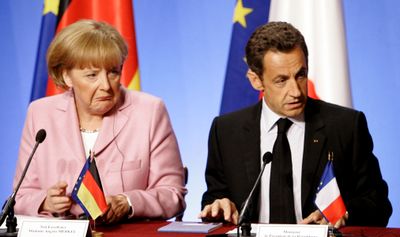EU struggling with banking fix

PARIS – Leaders of Europe’s four major powers pledged Saturday to work in concert to keep their banks afloat but failed to offer any major solutions for containing the growing financial crisis.
Reflecting the difficulty of getting European Union member states to act in unison, a hastily convened mini-summit failed to produce a region-wide bank bailout plan along the lines of the $700 billion package approved by the U.S. Congress on Friday.
Instead, the leaders of Britain, France, Germany and Italy were able to agree only on smaller steps, such as increased supervision of credit-rating companies and hedge funds.
Each country would be responsible for shoring up its own banks, the four nations said, promising to act “in a coordinated manner.”
Governments across Europe intervened to save five banks within the past week. But in a sign of the challenge ahead, one of those deals, a bid to rescue one of Germany’s biggest property lenders, Hypo Real Estate, collapsed Saturday when commercial banks withdrew their support of the plan.
The emergency summit among Europe’s big four was an attempt to allay some of the fears sweeping the continent, fears held by financial institutions and individual investors alike.
“This is a trial by fire,” said Dominique Strauss-Kahn, managing director of the International Monetary Fund, who met with French President Nicolas Sarkozy at the Elysee Palace before the summit began. “Europe … needs to show it is capable of responding in a crisis.”
But the three-hour meeting served to highlight the divisions that bedevil the EU, which comprises 27 member countries with just about as many competing agendas.
The leaders who met Saturday – Sarkozy, British Prime Minister Gordon Brown, German Chancellor Angela Merkel and Italian Prime Minister Silvio Berlusconi – tried to minimize those differences.
Besides their call for stronger regulation of hedge funds and credit-rating companies, the four leaders promised to crack down on executive pay and to release $41.5 billion in loans by the European Investment Bank to small and medium-size companies struggling to find credit.
“A global problem needs a global solution,” Sarkozy said. “Europe needs to demonstrate its will to find an answer.”